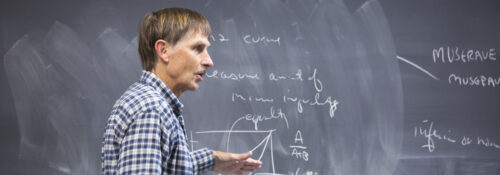
Ninja Swords are the New Report Cards
Written by Lauren Smyth
In Dr. Gary Wolfram’s classes, students with the best grades take home A’s—and ninja swords.
“A lot of [my] students are freshmen,” Wolfram said. “Your first semester is always your hardest semester. The ninja sword, I think, helps calm [students] down a little bit.”
The tradition started with Teenage Mutant Ninja Turtles, a TV show that first aired in the mid-’90s and followed superpowered turtles and their ninja-sword battles against city criminals. From there, Wolfram got the idea that maybe good grades weren’t the only motivator his students needed. After all, few students run around waving their transcripts in the air and showing off their shiny A+. But it’s a lot harder to hide a sword–and a lot more fun to wave it around.
“It’s beyond the academics,” Wolfram said. “People can walk around with the sword in their hands.”
Wolfram’s swords are usually made of foam or plastic–but he doesn’t always share that fact with first-time students. There are always a few murmurs in the classroom when he first announces the award: A what? Did he say a sword? What kind of sword? Is this how college usually works?
One of Wolfram’s former students, Victoria Kelly, ’24, said her hopes of winning a sword in Wolfram’s political economy class kept her motivated during her second semester of college.
I needed to set my sights on something to stay motivated throughout the class,” Kelly said. “So I knew from the beginning: ‘I am going for this thing. I want to be one of those students.’”
After missing a few questions on the final exam, Kelly left Hillsdale for break thinking she’d lost her chance. But that summer, she received an unexpected email from Wolfram—and one of the first things she did after returning to campus was pick up her very own “Sword Award” from his office.
“[The sword] has been treasured and kept in special places,” Kelly said, laughing. “Which normally means standing up in a corner to remind me: ‘Hey, you do cool things sometimes.’”
Now that she’s in her second-to-last semester of the political economy major, Kelly said the memory of that first award has stuck with her throughout her studies.
“It’s really cool that I knocked my first intro class to my major out of the park,” Kelly said.
She added that Wolfram’s prize isn’t just about the sword–it’s also about the prestige that comes with it.
“[Wolfram] always includes in [his explanation of the award] the fact that Dr. Clark has two of them,” Kelly said. “So it’s this invitation: If you put the effort in, you can rise to the level of Dr. Clark and other legendary economics students.”
Associate Professor of Economics Michael Clark, whose office is now next door to Wolfram’s, took Wolfram’s public finance and public choice classes when he was a Hillsdale student in the early 2000s. He earned Sword Awards in both, becoming one of only a few students to rack up multiple wins.
“The first one that I got, I was falling in love with economics, but I didn’t really realize that I was doing well,” Clark said. “So it was like a little signal: ‘Hey, think about your comparative advantage here. You get this pretty well.’”
Clark’s swords are still in his office. One is displayed in a corner, like Kelly’s. The other fell victim to an office rearrangement and hasn’t been seen since it vanished behind a row of metal bookshelves.
“I’m going to wait for some physics competition where they have to design something to reach down there and somehow get it,” Clark said. “But I know it’s there. Me personally, I know it’s there.”
Inspired by Wolfram’s tradition, Clark also gives prizes to top scorers in his classes.
“My sword is a book,” Clark said. “I give a student a book and a letter…which I call my Sword Award, and it confuses everybody.”
Each of Clark’s letters includes a phrase he learned from his grad school mentor, Peter Boettke, professor of economics and philosophy at George Mason University.
“[Boettke] got a letter from Hans Sennholz, who was a great in the Austrian tradition of teachers,” Clark said. “He recalls one line from it, and it is: ‘Liberty needs more thinkers like you.’ And that’s always in my letter to the students inside the book.”
Clark said that traditions like these, which honor exceptional performance, help students feel connected with their counterparts of past years.
“One of the things that we try to push in econ is that we do have a community,” Clark said. “And I think a lot of the students actually feel that. It’s like Team Econ.”
As the fall semester concludes, Wolfram is getting ready to hand out his next round of Sword Awards. Forged across several Amazon shopping trips, his collection these days includes colorful blades ranging from gold-rimmed plastic daggers to squishy medieval longswords. Wolfram keeps them all in a drawer behind his desk.
“The last [swords] that came in were these two bigger ones,” Wolfram said, brandishing a four-foot foam cutlass. “Obviously, I like to have fun in class.”
 Lauren Smyth, ’25, is an economics major and journalism minor. Outside of starting arguments in philosophy class, she enjoys curling up on a bench outdoors (sun, rain, or snow) to write novels or articles for her blog, www.laurensmythbooks.com.
Lauren Smyth, ’25, is an economics major and journalism minor. Outside of starting arguments in philosophy class, she enjoys curling up on a bench outdoors (sun, rain, or snow) to write novels or articles for her blog, www.laurensmythbooks.com.
Published in December 2023